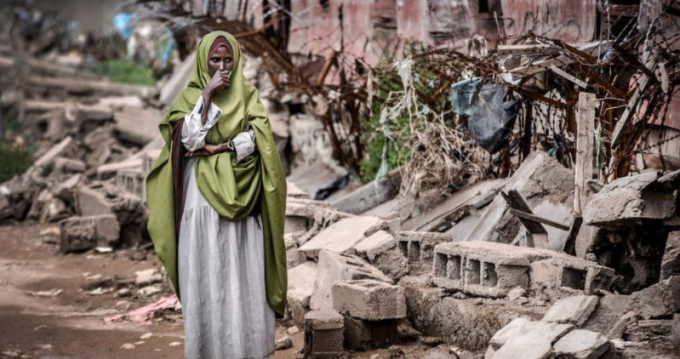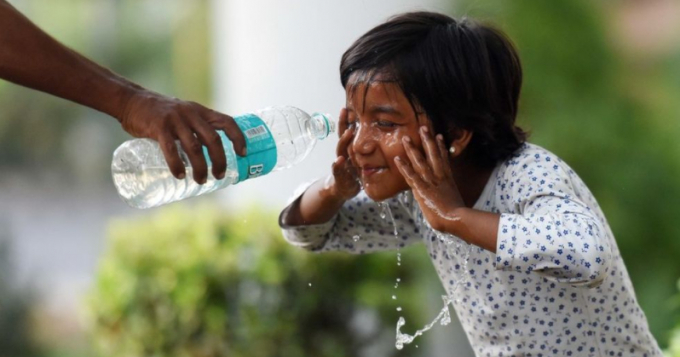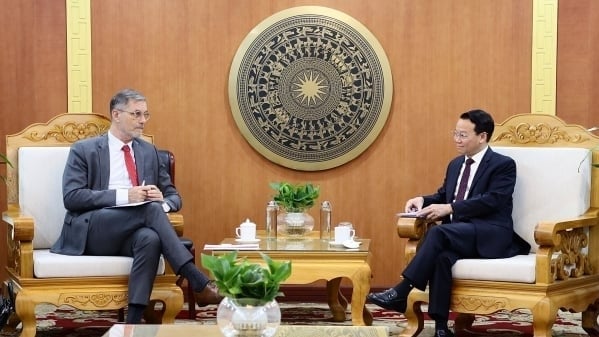May 22, 2025 | 17:04 GMT +7
May 22, 2025 | 17:04 GMT +7
Hotline: 0913.378.918
May 22, 2025 | 17:04 GMT +7
Hotline: 0913.378.918

A woman in Somalia surveys the damage done by intense flooding. Photo: Getty
These include funding for poorer nations to fight and adapt to climate change and compensation for the impacts they will be subjected to.
Those backing the plan represent more than half of the world's countries.
Without progress on these points, they say that COP26 will be worthless and will end in failure.
COP26 in November is expected to be the most important meeting on climate change since the Paris agreement was drawn up in 2015 and there are huge expectations that it will deliver significant progress in the battle against rising temperatures.
But this new position paper is a warning shot from more than 100 of the world's poorer countries, which are dismayed by the lack of progress they've seen so far - particularly at the G7 meeting in the UK in June.
They've set out five key issues which they say are critical for them in the negotiations:
+ Cutting emissions: Despite some progress, the sum total of climate policies in place will not keep global warming within the limits that governments agreed in Paris in 2015. An acceleration of net zero targets is urgently needed, led by those with the biggest responsibility and capacity.
+ Finance: At the failed Copenhagen COP in 2009, richer countries promised $100bn a year in climate finance by 2020, with increased annual sums from 2025. That target has not been met, say the developing countries - and it needs fixing if they are to trust the richer countries to keep to what they negotiate. This fund is intended to help those lower-income countries adapt to and fight climate change.
+ Adaptation: The developing countries are calling for at least 50% of climate finance to be used to help the most vulnerable to adapt to the effects of global warming.
+ Loss and damage: The historical failure of richer countries to cut their emissions adequately means that the most vulnerable are already experiencing permanent losses and damage. Responsibilities have to be acknowledged, say the poorer countries and promised measures delivered.
+ Implementation: Since Paris, rich and poor have haggled over issues like carbon trading and transparency. The developing countries want to see these questions finally resolved and want all countries to agree five-year common timeframes for their national climate plans.

A child cools down in India during a recent heatwave. Photo: Getty
"Highly vulnerable countries like Somalia are already suffering disproportionally from the impacts of climate change," said Mahdi M Gulaid, deputy prime minister of Somalia, one of the countries behind the plan.
"COP 26 must be a key moment of delivery and there can be no more excuses for unfulfilled promises, particularly climate finance."
The poorer nations draw parallels with the Covid-19 pandemic. They say that a failure to deliver vaccines and debt relief after Covid, will send a signal to these countries that they will be alone when climate impacts bite harder.
"Despite Covid understandably taking the headlines, climate change has been getting worse over the past year as emissions continue to rise and the lives and livelihoods on the front line suffer," said Sonam P Wangdi of Bhutan, who will chair the Least Developed Countries Group at COP26.
"COP26 needs to be a summit where we see action not words. We have enough plans: what we need is for major economies to start delivering on their promises. Our economies are suffering in the face of increased climate impacts and budgetary strains: either we invest our way out of this mess or we face a brutal decade of loss and damage."
In the report, the countries lay out what's termed a "fair share accounting", which allocates emissions cuts based on historical responsibility and the capacity to act.
Under that scenario, the US would need to reduce emissions by 195% below 2005 levels by 2030. This could be made up of a 70% cut in domestic emissions plus $80bn a year in support for developing countries.
For the UK, a similar approach would see a 70% emissions cut by 2030 plus $46bn a year in climate finance.
(BBC)
![Reducing emissions from rice fields: [3] New values generated from carbon credit](https://t.ex-cdn.com/nongnghiepmoitruong.vn/608w/files/content/2025/05/19/dsc09613-144700_71-150957.jpg)
(VAN) In addition to helping safeguard the environment, the low-emission rice cultivation model also generates new opportunities for farmers by leveraging the carbon credit market.
![Ho Chi Minh city adapts to climate change: [1] Vulnerable in the whirlwind of development](https://t.ex-cdn.com/nongnghiepmoitruong.vn/608w/files/duyenht92/2025/05/19/3131-ngap-nongnghiep-163121.jpg)
(VAN) As the country's economic engine with a rapid urbanization rate, Ho Chi Minh city is facing increasingly serious consequences of climate change.

(VAN) On May 21, Minister of Agriculture and Environment Do Duc Duy worked with Mr. Olivier Brochet, Ambassador Extraordinary and Plenipotentiary of the French Republic to Vietnam.

(VAN) VRG recently conducted a visit and working trip to the United States to demonstrate its efforts in redefining the role of rubber enterprises in the global value chain.

(VAN) In 2024, over 295 million people across 53 countries and territories faced acute hunger—an increase of almost 14 million people compared to 2023, while the number of people facing catastrophic levels of hunger reached a record high.

(VAN) World Environment Day 2025 (June 5) carries the theme 'Beat Plastic Pollution' continuing to emphasize the global urgency of addressing the plastic waste crisis.

(VAN) This was the assessment shared by experts at the workshop titled 'Assessing the Role and Potential of Low-Emission Rice Production Systems in Vietnam,' held on the morning of May 19.